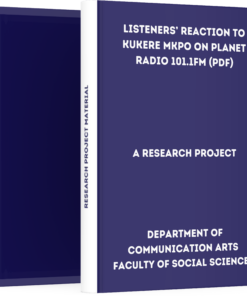Physicochemical Properties and Juvenile Phenology of African Walnut (Plukenetia Conophorum Muell Arg) Accessions from Southeastern Nigeria
₦3,000.00
If you are interested in getting this project material “Physicochemical Properties and Juvenile Phenology of African Walnut (Plukenetia Conophorum Muell Arg) Accessions from Southeastern Nigeria”, click on the DOWNLOAD BUTTON to make payment and the file will be delivered to your email immediately after confirmation.
Description
– Physicochemical Properties and Juvenile Phenology of African Walnut (Plukenetia Conophorum Muell Arg) Accessions from Southeastern Nigeria –
Download Physicochemical Properties and Juvenile Phenology of African Walnut (Plukenetia Conophorum Muell Arg) Accessions from Southeastern Nigeria. Crop Science students who are writing their projects can get this material to aid their research work.
Abstract
African walnut (Plukenetia conophorum Muell Arg) is a member of the family Euphorbiaceae. It is cultivated principally for the nuts which are eaten raw or served as snacks after roasting or boiling. P. conophorum serves many nutritional and medicinal purposes as well as a good source of rural income.
Despite the potentials of this plant, its existence is threatened by deforestation, urbanization, and similar activities. The present study was designed in an attempt to salvage this useful plant from extinction and provide the basis for its conservation.
Four accessions of P. Conophorum were collected from Abia, Anambra, Enugu, and Rivers states, southeastern Nigeria.
Introduction
African Walnut (Plukenetia conophorum Muell Arg) is a member of the family Euphorbiaceae. It has been described as a semi-wild plant found naturally in the wild (Okigbo, 1977), or maybe extensively encountered in rural dwellings and in farmlands where they are protected.
Walnut (P. conophorum) is of African origin (Nwosu, 1979); hence “African” mostly attached to its common name. It is cultivated principally for the fruits (nuts) which are edible and are eaten alone or served as snacks with kola nut when boiled.
Egharevba et al., 2005 also reported that the fruit is known in other African countries like Gabon, Sierra Leone, Cameroon, Madagascar, and the Central African Republic, where it provides income to the rural people consequently improving their economy and nutrition.
How to Download this Project Material
First, note that we are one of the best and most reliable online platforms because we don’t retain any of your personal information or data as regards making payments online.
PRICE: ₦3,500 ₦3,000 (Three Thousand Naira Only)
Make a bank deposit or mobile transfer of ₦2,000 only to the account given below;
Bank Name: UBA Account Number: 1022564031 Account Name: TMLT PRO SERVICES
After making the payment, CLICK HERE to send the following on WhatsApp;
- Depositor’s Name or Screenshot of Payment
- Name of the Past Question
- Active Email Address
or Call Us On +2348082284439 Once your details have been received and your payment confirmed by us, you will receive the past question in your email or WhatsApp within 5 Minutes.
Guarantee of Getting the Material
We understand that due to the high rate of fraud, many people are afraid of making purchases online but be rest assured that PastExamQuestions will deliver your material after payment.
Once your details have been received and your payment confirmed by us, you will receive the past question in your email or WhatsApp.
Give us Feedback
Have we been able to satisfy you? How well do you think the material will be helpful after having gone through it? Does the price worth the material?
Let’s hear from you! We recommend that our customers give feedback at the end of every transaction to enable us to serve better. You can do this by clicking the review button on this page.
Where is the review button? >> Just scroll up to where you see reviews





Reviews
There are no reviews yet.